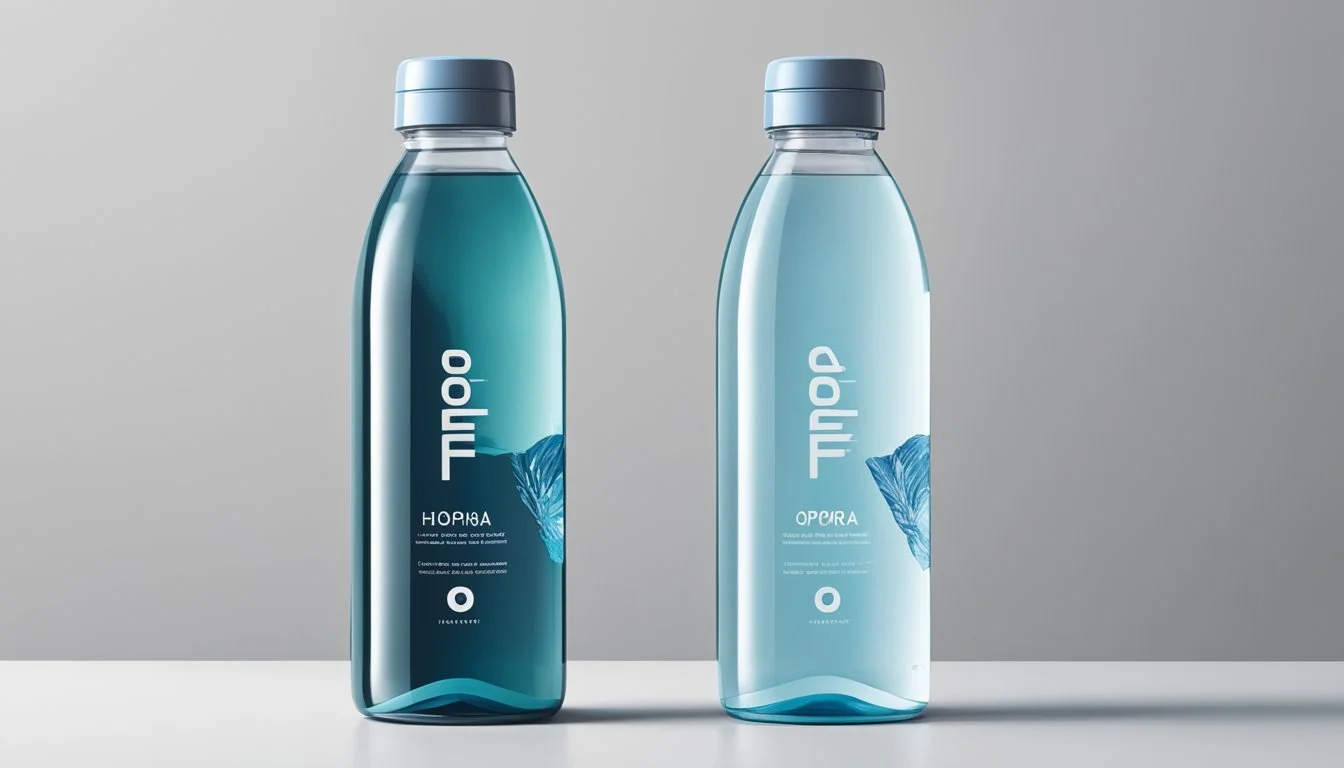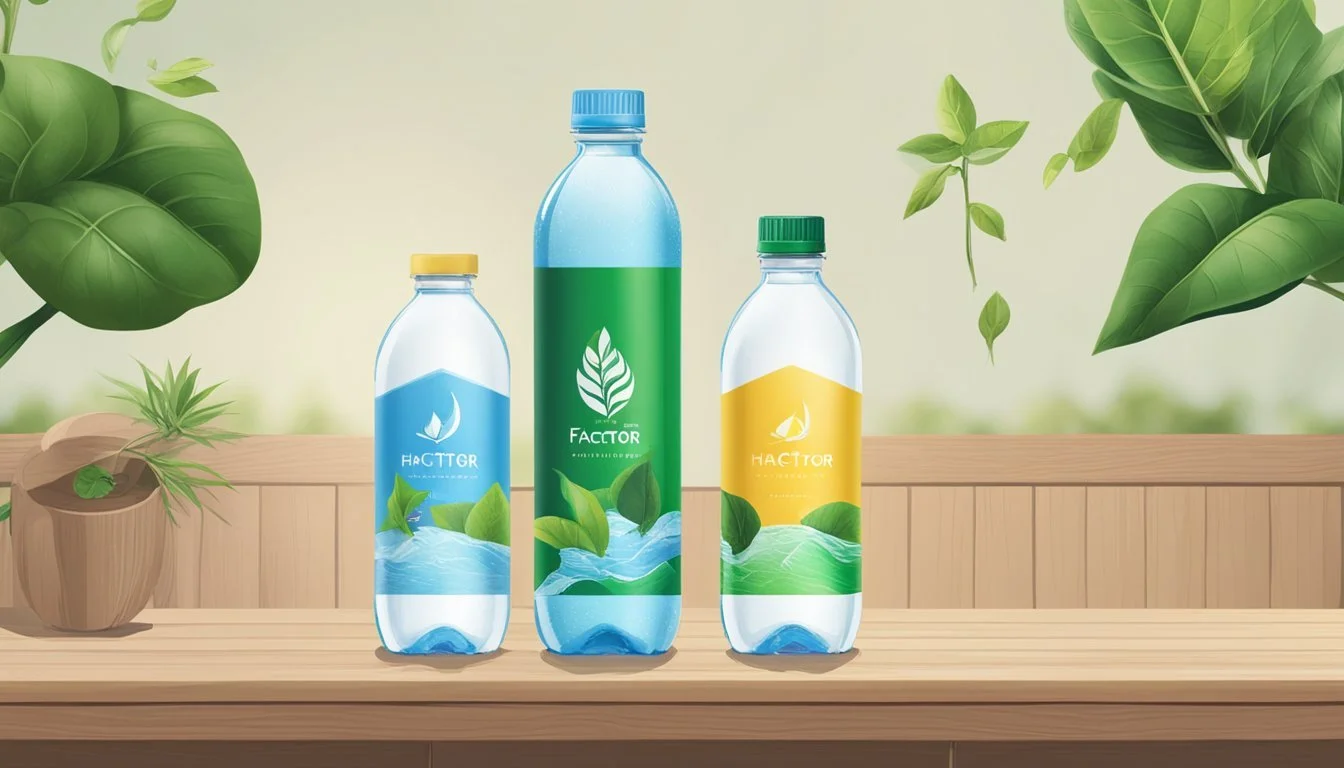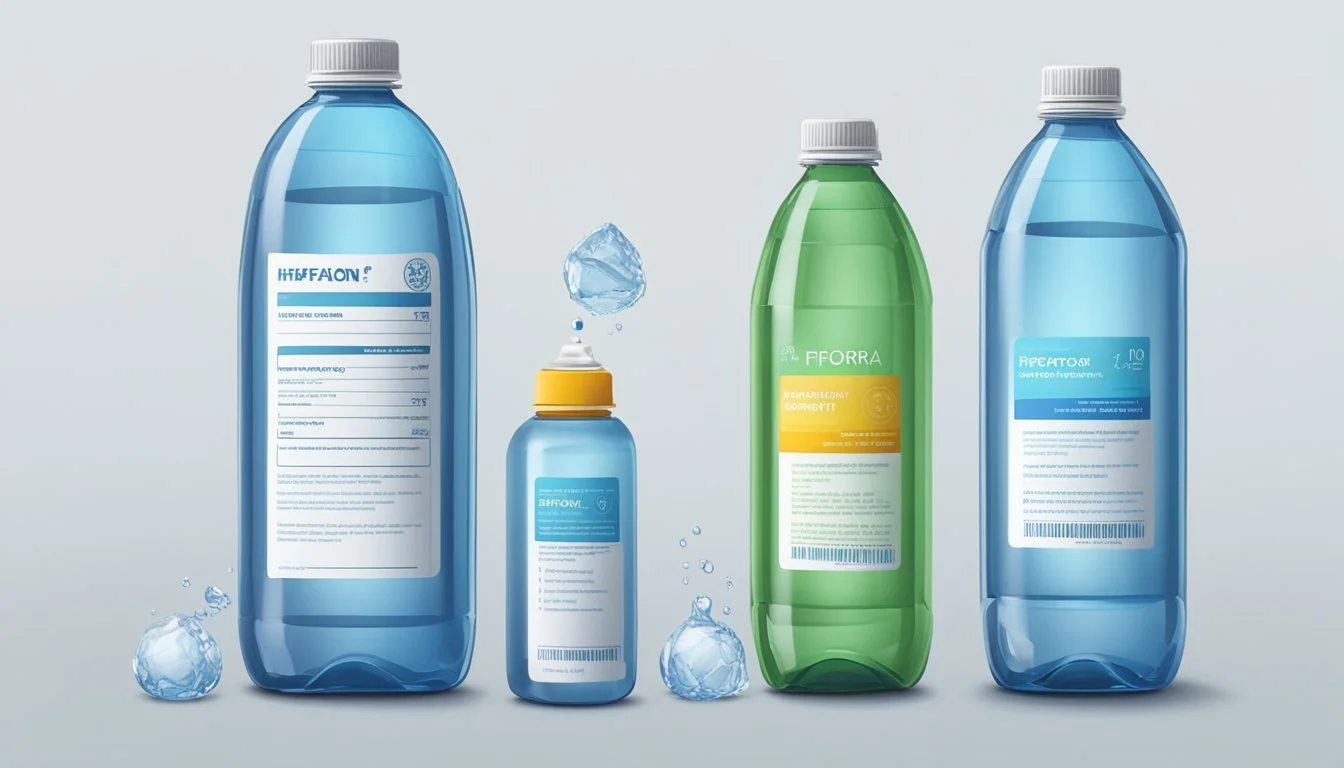Ophora vs. HFactor
Comparing Premium Bottled Water Brands for Health and Quality
With the ever-increasing popularity of premium bottled water, comparing brands is crucial for discerning consumers. Two noteworthy options are Ophora and HFactor, each offering unique qualities that may sway your decision.
Ophora Water boasts a superior purification process involving micro and nano filters, ensuring a level of cleanliness that sets it apart from many competitors. On the other hand, HFactor differentiates itself by infusing molecular hydrogen, which claims various health benefits.
When deciding between Ophora and HFactor, it ultimately hinges on whether you prioritize advanced filtration or innovative hydration technology. Understanding these distinctions can guide you toward the best choice for your hydration needs.
Understanding Bottled Water
Bottled water comes in various forms, such as spring, purified, and alkaline, each providing different benefits and characteristics. Comparing bottled water to tap water reveals significant differences in taste, convenience, and safety.
Definition and Types of Bottled Water
Bottled water refers to water that is sold in bottles for commercial consumption. The main types include:
Spring Water: Sourced from natural springs, it often retains natural minerals.
Purified Water: Typically undergoes processes like reverse osmosis to remove impurities.
Alkaline Water: Has a higher pH level, often marketed as beneficial for reducing acidity in the body.
Mineral Water: Contains dissolved minerals and is sourced from mineral springs.
Each type offers a unique taste and set of benefits, catering to different consumer preferences.
Bottled Water vs. Tap Water
Tap water is municipally treated and delivered via plumbing systems. It is subject to regulatory standards to ensure safety but can contain additives like chlorine for purification.
Bottled water is often preferred for its perceived purity and taste. It is also highly portable, making it convenient for on-the-go hydration. Some bottled waters, like alkaline and mineral varieties, offer additional health benefits not typically found in tap water.
The choice often comes down to personal preferences, safety concerns, and specific health needs.
The Science Behind Hydration
Hydration is crucial for maintaining bodily functions, including temperature regulation and nutrient transport. The body's cells rely on adequate fluid levels to operate efficiently.
Spring water and mineral water provide naturally occurring electrolytes, which can enhance hydration.
Purified water, free from contaminants but often lacking in minerals, is ideal for individuals concerned about water purity.
Alkaline water is thought to neutralize body acidity, although scientific support for this claim varies.
Different bottled water types can cater to specific hydration needs, making them a valuable option in sustaining overall health.
The Bottled Water Industry
The bottled water market has experienced significant growth in recent years, driven by various factors such as health considerations and convenience. This section dives into the leading water brands and the prevailing market trends and consumer preferences.
Leading Water Brands
Numerous brands dominate the bottled water industry, each catering to different segments based on price, taste, and health benefits. Essentia and Smartwater are popular for their ionized and vapor-distilled water, respectively, offering enhanced hydration benefits.
Voss, known for its sleek glass bottles, often attracts a more premium customer base, while Pure Life and Poland Spring are widely recognized as more affordable options.
Fiji and Acqua Panna, sourced from pristine locations, position themselves in the higher-end market due to their taste and mineral content. Brands like Icelandic Glacial and Eternal highlight their natural purity and alkaline properties, catering to health-conscious consumers.
Infused waters like CORE Hydration not only promise balanced pH levels but also add flavor, increasing their appeal. This range of brands underscores the diversity in consumer preferences and financial commitment to bottled water.
Market Trends and Consumer Preferences
The bottled water market is growing rapidly, with premium and functional waters seeing notable demand increases. Consumers are not only choosing bottled water for convenience but also as a preventative health measure. This is evident as brands emphasize attributes like purity, mineral content, and pH balance.
Concerns over water contamination and a growing awareness of health have led to increased demand for products like Essentia and Fiji, which promise additional benefits. Brands marketing infused water tap into a consumer preference for flavored and enhanced hydration options.
Sustainability is also a critical trend. Many companies, like Voss, are adopting eco-friendly packaging to attract environmentally-conscious consumers. Despite a higher price tag, the promise of purity and wellness keeps driving the market forward, with sales volumes reaching record highs, particularly in countries like the U.S.
Health and Sustainability Factors
When comparing Ophora and HFactor bottled waters, it's essential to consider not only the health benefits but also the environmental sustainability of their production and usage.
Environmental Impact of Bottled Water
Ophora claims to produce "the world's healthiest water," utilizing advanced purification techniques to remove contaminants. Their production process aims to be environmentally friendly by minimizing pollution and using less energy.
HFactor, while known for its hydrogen-enriched water, does not provide specific details about their environmental practices. This raises questions about the overall energy consumption and waste generated by their production.
Key Points:
Ophora focuses on reducing contaminants and pollution.
Lack of detailed environmental practices from HFactor.
Energy efficiency and waste management are critical factors.
Safe Drinking Water Standards and Quality Control
Both Ophora and HFactor strive to meet stringent safe drinking water standards. Ophora touts its hyper-oxygenated, mineralized water, highlighting its ability to filter out over 30,000 known contaminants. This rigorous quality control aligns with FDA and EPA standards for safe drinking water.
HFactor, on the other hand, concentrates on hydrogen infusion, claiming various health benefits. Despite some skepticism about its efficacy, HFactor maintains transparency in its manufacturing processes, ensuring compliance with safe drinking water regulations.
Key Points:
Ophora's extensive contaminant removal and mineralization.
HFactor's focus on hydrogen infusion with transparent processes.
Both brands comply with FDA and EPA standards.
Water as Part of a Healthy Lifestyle
Ophora promotes its water as an integral part of a healthy lifestyle, emphasizing its nano-pure, pH-balanced formula. They position their water as suitable for daily consumption, aiming to support overall well-being.
HFactor markets its hydrogen water as potentially therapeutic, suggesting skin-care and health benefits. While there is debate about the effectiveness of hydrogen water, many consumers find it appealing for its purported advantages.
Key Points:
Ophora's water supports a balanced, mineral-rich diet.
HFactor offers potential health and skin-care benefits.
Both aim to cater to health-conscious individuals seeking quality hydration.
Ophora Water and HFactor Water Compared
This section explores Ophora and HFactor bottled waters in terms of their origins, water sources, purity, treatment processes, innovations, taste profiles, and consumer reviews.
Brand Origins and Water Sources
Ophora Water harnesses pristine water sources with an emphasis on purity and health benefits. Originating from the United States, it taps into sources known for low contaminant levels.
HFactor, founded by Gail Levy, focuses on hydrogen-infused water. The water is sourced from U.S. springs, emphasizing natural purity before undergoing the specialized hydrogen infusion process.
Purity and Water Treatment Processes
Ophora employs advanced hyper-oxygenated technology to purify its water, removing over 30,000 known contaminants. The result is nano-pure, pH-balanced, and mineralized water that aims to provide superior health benefits.
HFactor uses a patented Hydro-7 technology to infuse the water with molecular hydrogen. The process retains the natural purity while adding hydrogen for potential antioxidant properties.
Innovations in Water: Hyper-Oxygenation and Infusion
Ophora stands out by introducing hyper-oxygenation, which is the process of infusing water with increased levels of oxygen. This aims to enhance hydration and overall well-being.
HFactor distinguishes itself with its hydrogen infusion. The hydrogen is believed to help reduce inflammation and improve recovery times, making it popular among athletes.
Taste Profile and Consumer Reviews
Ophora is often described as clean and crisp, with a refreshing quality that earns it high marks at events like the Berkeley Springs International Water Tasting. Consumers appreciate its purity and the perceived health benefits.
HFactor's taste is generally neutral, with a slight mineral note due to the hydrogen. It has mixed reviews, with some praising its health benefits and others noting a preference for different bottled waters.
Scientific Perspectives on Water Quality
When comparing the quality of Ophora and HFactor bottled water, it's essential to evaluate specific scientific parameters such as pH levels, electrolyte content, and the validity of their health claims. A thorough analysis of clinical studies adds further depth to this comparison.
pH Levels and Electrolyte Content
The pH level and electrolyte content in bottled water can significantly influence overall water quality. Ophora is known for its high oxygen content and balanced pH level meant to optimize bodily functions. Typically, Ophora's pH ranges from 8.0 to 9.0, aligning with the alkaline side, which is believed to help neutralize acid in the body.
HFactor, on the other hand, emphasizes its hydrogen-infused water, which boasts potential antioxidant benefits. The pH level of HFactor is roughly neutral, around 7.5. Both brands claim to have added electrolytes, such as potassium, magnesium, and calcium, which are crucial for hydration and cellular functions. However, the specific electrolyte concentrations are usually proprietary information.
Clinical Studies and Health Claims
Clinical data is imperative when assessing the health claims made by bottled water brands. For instance, studies on hydrogen-infused water, like HFactor, suggest potential benefits such as reduced oxidative stress and improved muscle recovery. Some small-scale studies in animal models and at the cellular level support these claims, though more extensive human trials are needed.
Ophora's claims about enhanced oxygenation and improved cellular health are backed by preliminary clinical studies. These studies highlight possible benefits in athletic performance and overall wellness. Nonetheless, definitive evidence from large-scale clinical trials remains sparse. Health experts recommend that consumers examine such claims with a critical eye and prioritize drinking water quality in accordance with regulatory standards.
Consumer Convenience and Lifestyle
Examining consumer convenience and lifestyle, it is important to consider accessibility, ideal usage contexts such as homes and offices, and the influence of luxury and specialty water trends on preferences.
Accessibility at Home and in Grocery Stores
Ophora and HFactor both prioritize accessibility to cater to consumer needs. Ophora is available in many major grocery stores and online retailers, making it easy for consumers to purchase.
HFactor stands out for its convenient packaging, often found in both specialized health stores and larger grocery chains. The popularity of these brands is partly due to the ease with which consumers can purchase them, bolstered by extensive distribution channels.
Water for the Office and On-the-Go
Both brands excel in catering to professionals. Ophora offers sleek, reusable bottles, making it a popular choice for office environments. Its commitment to high-quality water with health benefits appeals to workers seeking to maintain hydration throughout the day.
HFactor, with its flexible and portable pouches, is ideal for those on-the-go. The hydrogen-infused water offers potential recovery benefits, targeting athletes and busy professionals alike. This packaging is not only practical for transport but also fits into most car cup holders and office desks.
Luxury and Specialty Water Trends
Ophora targets the luxury market with a focus on water purity and a sophisticated brand image. Often featured in high-end restaurants and recommended by water sommeliers, it appeals to consumers seeking quality and exclusivity.
HFactor taps into the specialty market with its unique hydrogen-infused option, catering to niche health-conscious consumers. This trend towards functional benefits, beyond basic hydration, aligns with contemporary health and wellness lifestyles.
In summary, both brands meet distinct needs, with Ophora focusing on luxury and widespread availability, and HFactor emphasizing portability and specialized health benefits, ensuring an optimal fit for various consumer lifestyles.
Addressing Safety and Health Concerns
When evaluating the safety and health benefits of bottled water brands like Ophora and HFactor, it's essential to consider contaminants and filtration methods, hydration benefits, and regulatory standards.
Contaminants and Filtration Methods
Ophora and HFactor employ different approaches to filtrate water. Ophora utilizes extensive filtration, including reverse osmosis, ultraviolet light, and ozone disinfection, aiming to eliminate heavy metals, pharmaceuticals, and microbial contaminants.
HFactor, on the other hand, focuses on infusing hydrogen gas into purified water but doesn’t emphasize filtration as heavily. Consumers should check if the purification process removes common contaminants found in municipal water. Careful selection is critical to avoid exposure to plastic-derived chemicals or other hazardous substances.
Proper Hydration and Health Benefits
Both brands market their products as offering superior hydration qualities. Ophora claims to enhance hydration due to its structured water technology, which purportedly allows for better cellular absorption.
HFactor promotes the potential benefits of hydrogen-infused water, like reducing inflammation and boosting energy. It's important for consumers to stay hydrated for overall health, but they should seek products backed by scientific evidence.
Regulatory Standards and Oversight
Safety regulations for bottled water in the U.S. are stringent. The FDA oversees bottled water, ensuring it meets or exceeds the EPA standards set for municipal water. Both Ophora and HFactor must comply with these regulatory frameworks.
Consumers should be aware that despite regulatory oversight, sporadic contamination issues may occur. Checking the latest Consumer Reports and brand transparency on water quality testing can provide further assurance.
Final Assessment
When comparing Ophora and HFactor, several critical dimensions stand out.
Taste: Ophora offers a premium taste, partially due to its nano-pure water quality and alkaline balance at a pH of 8.0. Although it's more expensive, many find its taste superior. HFactor, while generally acceptable, has received mixed reviews on flavor.
Health Benefits: HFactor hydrogen water claims therapeutic benefits with a hydrogen concentration of 0.1625mg per pouch. However, this dosage may fall short of being effective. Ophora, with 40 ppm stabilized oxygen and medical-grade filtration, is marketed as healthier, though specifics on health impacts may vary.
Convenience: HFactor scores high in convenience due to its pricing and widespread availability. Ophora, although available online, is pricier at $13.99 per bottle, making it less accessible for everyday use.
Quality Control: Ophora is regularly tested for purity and pH, ensuring consistent quality. HFactor also undergoes testing but does not emphasize this as strongly.
Environmental Impact: Both brands use plastic packaging, which impacts their environmental friendliness. Ophora and HFactor have not claimed significant steps towards sustainable packaging.
Scientific Backing: HFactor highlights hydrogen benefits which are dose-dependent, with studies to back some claims. Ophora emphasizes its medical-grade filtration and stabilized oxygen, grounding its benefits in advanced treatment processes.
In conclusion, each brand offers unique advantages depending on what consumers prioritize: premium quality and taste for Ophora, or convenience and affordability for HFactor.
More About Ophora
Mountain Valley Spring Water vs Ophora: Which Bottled Water is Better?
Ophora vs Kirkland Signature: Which Bottled Water is Better?
Richard's Rainwater vs Ophora: Which Bottled Water is Better?
Whole Foods Italian Still Mineral water vs Ophora: Which Bottled Water is Better?
More About HFactor
Whole Foods Italian Still Mineral water vs HFactor: Which Bottled Water is Better?
Richard's Rainwater vs HFactor: Which Bottled Water is Better?
Mountain Valley Spring Water vs HFactor: Which Bottled Water is Better?
Kirkland Signature vs HFactor: Which Bottled Water is Better?
Icelandic Glacial vs HFactor: Which Bottled Water is Better?




